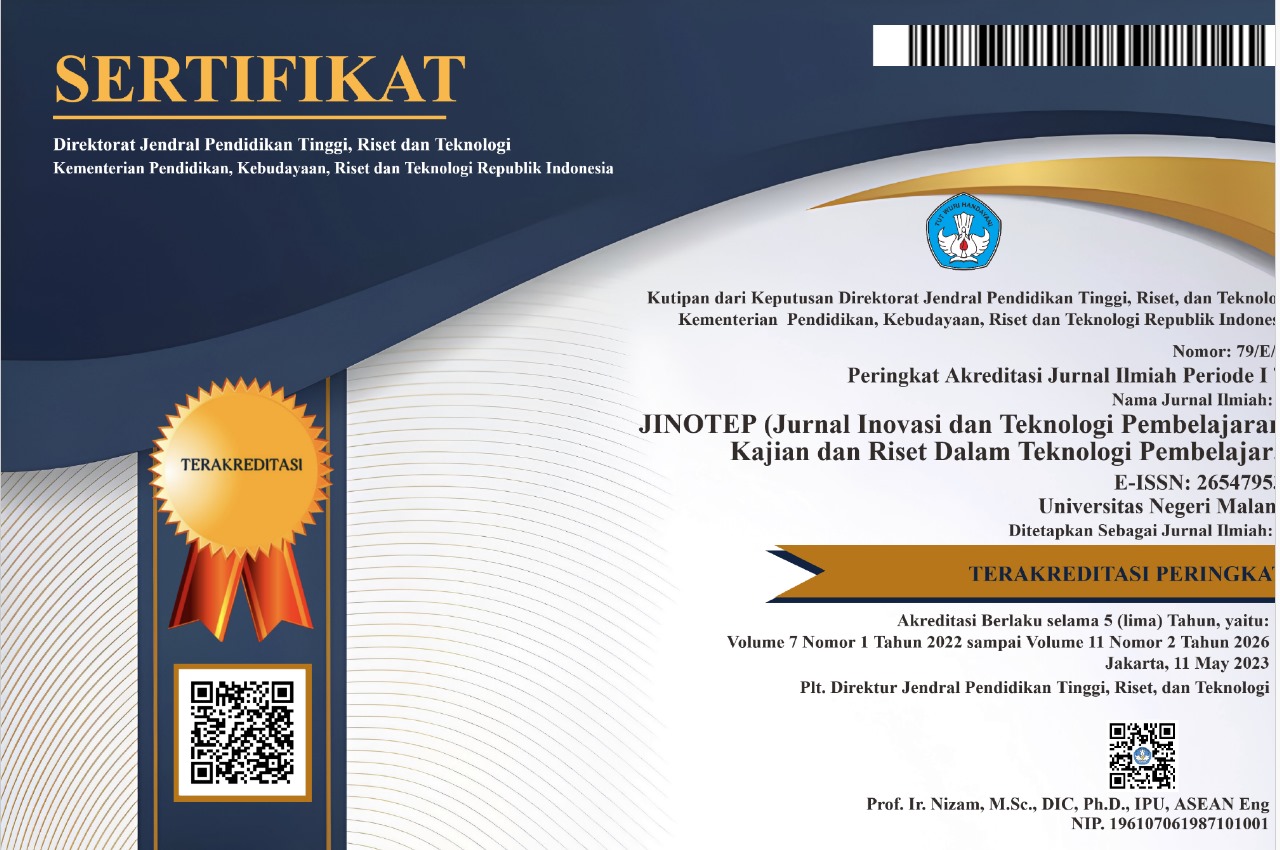Innovation for measuring students' metacognitive abilities through project-based learning
Abstract
Abstrak: Kemampuan metakognitif dinilai berpengaruh terhadap bagaimana peserta didik dapat belajar secara mandiri untuk memperoleh prestasi akademik. Untuk itu, penelitian ini bertujuan untuk mengukur bagaimana pembelajaran berbasis proyek dapat meningkatkan kemampuan metakognitif peserta didik dan mengidentifikasi kesadaran metakognitif peserta didik dalam pembelajaran. Data dalam penelitian ini dikumpulkan melalui pretest, posttest, observasi, dan angket kesadaran metakognitif. Data-data tersebut dianalisis secara kuantitatif dan kualitatif untuk menghasilkan pemahaman yang lebih baik tentang masalah dan hasil penelitian. Hasilnya, kemampuan peserta didik dalam memecahkan masalah metakognitif mengalami peningkatan. Indeks Gain yang diperoleh dari rata-rata hasil belajar peserta didik adalah 0.7, yang berarti memiliki signifikansi peningkatan yang tinggi. Dijelaskan pula bahwa kemampuan metakognitif mereka berkembang dilihat dari perubahan kategori kemampuan mereka yang diobservasi selama pelaksanaan proyek. Kesadaran metakognitif peserta didik setelah pembelajaran berbasis proyek mulai tampak pada beberapa aspek, di antaranya strategi pencarian dan perencanaan.
Abstract: Metacognitive abilities can influence how students learn independently to achieve academic success. For this reason, the study aimed to examine how project-based learning can enhance students’ metacognitive abilities and identify students’ metacognitive awareness. To understand those goals, three steps of data collection were done, including pre-test, post-test, observation, and questionnaires. Both quantitative and qualitative approaches were conducted to better understand the problem and the results. As a result, the ability of students to solve metacognitive problems has improved. The Gain index from the student learning process is 0.7, means it has a significant increase. It was also explained that their metacognitive abilities had developed judging by the changes in their ability categories that were observed during project implementation. Several aspects, including search strategy and planning, were evident in students' metacognitive awareness after project-based learning.
Keywords
Full Text:
PDFReferences
Alshammari, M. K. (2015). The effect of using metacognitive strategies for achievement and the trend toward social studies for intermediate schools students in Saudi Arabia. International Journal of Education, Learning and Development, 3(7), 47-54.
Cambridge Assessment International Education. (2017). Metacognition. [On line]. Available: https://www.cambridgeinternational.org/Images/272307-metacognition.pdf.
Derevenskaia, O. (2014). Active learning methods in environmental education of students. Procedia - Social and Behavioral Sciences . https://doi.org/10.1016/j.sbspro.2014.04.086
Dirgantoro, K. P. S. (2018). Pendekatan keterampilan metakognitif dalam pembelajaran matematika. MATHLINE: Jurnal Matematika Dan Pendidikan Matematika, 3(1), 1-10. https://doi.org/10.31943/mathline.v3i1.78
Djudin, T. (2017). Using metacognitive strategies to improve reading comprehension and solve word problems. Journal of Education, Teaching and Learning, 2(1), 124-129. https://doi.org/10.26737/jetl.v2i1.151
Dortmans, BMA, Diener, S., Verstappen, BM, and Zurbrügg, C. (2017). Black Soldier Fly Biowaste Processing. Switzerland: Eawag- Swiss Federal Institute of Aquatic Science and Technology.
Hakim, A., Setyosari, P., Degeng, N. S., & Kuswandi, D. (2018). Pengaruh strategi pembelajaran (pembelajaran berbasis proyek vs pembelajaran langsung) dan motivasi belajar. JINOTEP (Jurnal Inovasi dan Teknologi Pembelajaran): Kajian dan Riset Dalam Teknologi Pembelajaran, 3(1), 1-13. http://dx.doi.org/10.17977/um031v3i12016p001
Hatami, A., & Moghaddam, HH (2014). Analysis of the effect of metacognition on educational progress of students in topic of logarithm. International Journal of Education and Research, 2(7), 565-570.
Iskandar, S. M. (2016). Pendekatan keterampilan metakognitif dalam pembelajaran sains di kelas. Erudio Journal of Educational Innovation, 2(2), 13-20. https://doi.org/10.18551/erudio.2-2.3
Lai, E. and Viering, M. (2012). Assessing 21st century skills: integrating research findings of the national council on measurement in education. New York: Pearsons.
Larmer, J. (Ed.). (2019). Gold standard PBL: Project based teaching practices. Buck Institute for Education . Retrieved from http://bie.org/about/what_pbl.
Listiana, L., Susilo, H., Suwono, H., & Suarsini, E. (2016). Empowering students' metacognitive skills through new teaching strategy (group investigation integrated with think talk writing) in biology classroom. Journal of Baltic Science Education, 15(3), 391-401. https://doi.org/10.33225/jbse/16.15.391
McCabe, J. (2011). Metacognitive awareness of learning strategies in undergraduates. Memory & cognition, 39, 462-476. https://doi.org/10.3758/s13421-010-0035-2
Molenberghs, P., Trautwein, FM, Böckler, A., Singer, T., & Kanske, P. (2016). Neural correlates of metacognitive ability and of feeling confident: A large-scale fMRI study. Social Cognitive and Affective Neuroscience . https://doi.org/10.1093/scan/nsw093
Monita, L., Sutjahjo, SH, Amin, AA, and Fahmi, MR (2017). Urban organic waste management using black soldier fly (hermetia illucens) larvae. Journal of Natural Resources and Environment Management , 7(3), 227-234.
Musa, F., Mufti, N., Latiff, RA, & Amin, MM (2012). Project-based learning (pjbl): inculcating soft skills in a 21st century workplace. Procedia - Social and Behavioral Sciences. https://doi.org/10.1016/j.sbspro.2012.09.315
Purwanto, MG, Nurliani, R., Kaniawati, I., & Samsudin, A. (2018). Promoting the hydrostatic conceptual change test (HCCT) with four-tier diagnostic test items. Journal of Physics: Conference Series , 1013 (1). https://doi.org/10.1088/1742-6596/1013/1/012035
Rahmawati, Y. and Haryani, S. (2015). Application of project-based learning models to improve metacognitive skills. Journal of Chemistry Education Innovation, 9 (2), 1596-1606.
áiz Manzanares, M. C., & Carbonero Martín, M. Á. (2017). Metacognitive precursors: an analysis in children with different disabilities. Brain Sciences, 7(10), 136. https://doi.org/10.3390/brainsci7100136
Saragi, ES and Bagastyo, AY (2015). Reduction of Organic Solid Waste by Black Soldier Fly (Hermetia illucens) Larvae. Proceedings of environmental Technology & Management Conference , 1-6.
Sart, G. (2014). The effects of the development of metacognition on project-based learning. Procedia - Social and Behavioral Sciences , 152 , 131–136. https://doi.org/10.1016/j.sbspro.2014.09.169
Shank, P. (2017). Practice and feedback for deeper learning. Learning Peaks LLC.
Sholihah, M., Zubaidah, S., & Mahanal, S. (2015). Metacognitive skills of Negeri Batu high school students in biology. Proceedings of the National Seminar on Biology / Science and Learning , 1 (4), 1669–1676.
Siegel, MA (2012). Filling in the distance between us: group metacognition during problem solving in a secondary education course. Journal of Science Education and Technology, 21, 325-341. https://doi.org/10.1007/s10956-011-9326-z
Sonowal, M., & Kalita, M. (2017). A study on metacognitive awareness and academic achievement of higher secondary level students of Dibrugarh town of Assam, India. The Clarion-International Multidisciplinary Journal, 6(1), 69-74. https://doi.org/10.5958/2277-937x.2017.00012.0
Suseno, R., Indriyani, I., Afdal, M., & Nizori, A. (2022). Efektivitas Model Pembelajaran Berbasis Proyek Terhadap Keaktifan dan Kemampuan Mahasiswa. JINOTEP (Jurnal Inovasi dan Teknologi Pembelajaran): Kajian dan Riset Dalam Teknologi Pembelajaran, 9(1), 90-98. http://dx.doi.org/10.17977/um031v9i12022p090
Tian, Y., Fang, Y., & Li, J. (2018). The effect of metacognitive knowledge on mathematics performance in a self-regulated learning framework-multiple mediation of self-efficacy and motivation. Frontiers in Psychology, 9, 2518. https://doi.org/10.3389/fpsyg.2018.02518
Ulfiyani, S. (2016). Pemaksimalan peran guru dalam pembelajaran keterampilan berbicara di sekolah. Transformatika: Jurnal Bahasa, Sastra, dan Pengajarannya, 12(2), 105-113.
Valderrama-Hernández, R., Alcántara, L., & Limón, D. (2017). The complexity of environmental education: teaching ideas and strategies from teachers. Procedia - Social and Behavioral Sciences . https://doi.org/10.1016/j.sbspro.2017.02.137
Wan Husin, WNF, Mohamad Arsad, N., Othman, O., Halim, L., Rasul, MS, Osman, K., & Iksan, Z. (2016). Fostering students' 21st century skills through project oriented problem based learning (Popbl) in an integrated stem education program. Asia-Pacific Forum on Science Learning and Teaching , 17 (1), 3.
Zhao, L., & Mo, S. (2016). The impact of metacognitive awareness on class performance in financial accounting courses. Academy of Educational Leadership Journal, 20 (2), 78–88.
Zhou, S., Wang, Y., & Zhang, C. (2016). Pre-service science teachers' PCK: Inconsistency of pre-service teachers' predictions and student learning difficulties in newton's third law. Eurasia Journal of Mathematics, Science and Technology Education, 12(3), 373-385. https://doi.org/10.12973/eurasia.2016.1203a
Zhang, L. , & Seepho, S. (2013). Metacognitive strategy use and academy reading achievement: insights from a Chinese context. Electronic Journal of Language Teaching, 10 (1), 54-69.
DOI: http://dx.doi.org/10.17977/um031v10i12023p071
Refbacks
- There are currently no refbacks.
Copyright (c) 2023 Nur Rokhmani Tri Siswi, Muhammad Guntur Purwanto, Mimin Nurjhani Kusumastuti, Yayan Sanjaya

This work is licensed under a Creative Commons Attribution-ShareAlike 4.0 International License.
======================================================================
Jurnal Inovasi dan Teknologi Pembelajaran published by Universitas Negeri Malang in collaboration with the Asosiasi Program Studi Teknologi Pendidikan Indonesia (APS TPI) and Ikatan Profesi Teknologi Pendidikan Indonesia (IPTPI) with a MoU.
Publisher Address:
Educational Technology Laboratorium, Building D5, 1st Floor
Faculty of Education, Universitas Negeri Malang
Semarang St. No. 5, Malang City, East Java Province, Postal Code 65145
Email: jinotep.fip@um.ac.id
======================================================================

JINOTEP is licensed under a Creative Commons Attribution-ShareAlike 4.0 International License.
JINOTEP Statistics (Since July 13th, 2020)



.png)




.png)
1.png)
1.png)
4.png)
2.png)
1.png)
1.png)
.png)


_3.png)





1.png)
.png)